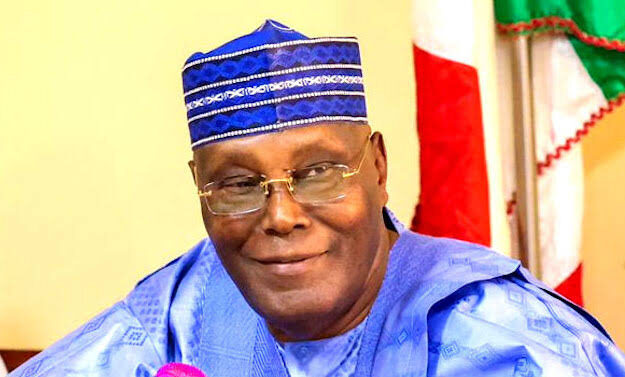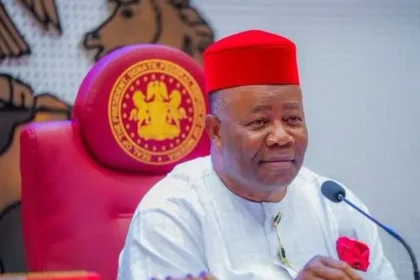Alhaji Atiku Abubakar GCON believes he has the requisite experience to lead the Coalition. Truly so. Alhaji Atiku has an interesting story.
Have you ever wondered how Alhaji Atiku Abubakar (GCON) plans to beat President Tinubu in 2027? We can tell you. We can tell you that he believes if he can galvanise opposition groups to form a broad Coalition, with him as presidential candidate, he would defeat Tinubu.
Atiku aims to create a united opposition coalition that includes regional leaders, creatives, and Online influencers to challenge the current administration. …CONTINUE READING


His plan is to get a suitable platform that he can use and with Peter Obi joining him, they can both combine their votes to take out the President. He feels their combined 13 million votes recorded in 2023 election will far outweigh Tinubu’s 8 million votes, demonstrating the potential strength of a united opposition.
Part of his worry is that Atiku who is 79, will be 80 next year and by 2027 will be 81 feels this is his last chance at the Presidency, because by 2031 he would have been 85. And he has contested 6 times. And 2027 will be the 7th time. He feels the teaming up of formidable forces will definitely defeat Tinubu.
Alhaji Atiku Abubakar GCON believes he has the requisite experience to lead the Coalition. Truly so. Alhaji Atiku has an interesting story. He served as the Vice President of Nigeria from 1999 to 2007 during the presidency of Olusegun Obasanjo. He ran for the office of Governor of Adamawa State in 1990 and 1996 unsuccessfully, but won in 1998. Before he was sworn in, he was selected as running mate to former military leader, Olusegun Obasanjo, during the 1999 presidential election and was re-elected in 2003.
He ran unsuccessfully for President of Nigeria 6 times, in 1993, 2007, 2011, 2015, 2019, and 2023. He ran in the Social Democratic Party presidential primaries in 1993, but lost to Moshood Abiola and Baba Gana Kingibe. He was a presidential candidate of the Action Congress in the 2007 presidential election coming in third to Umaru Yar’Adua of the PDP and Muhammadu Buhari of the ANPP.
He contested the presidential primaries of the People’s Democratic Party during the 2011 presidential election losing out to incumbent President Goodluck Jonathan. In 2014, he joined the All Progressives Congress ahead of the 2015 presidential election and contested the presidential primaries losing to Muhammadu Buhari. In 2017, he returned to the Peoples Democratic Party and was the party presidential candidate during the 2019 presidential election, again losing to incumbent President Muhammadu Buhari.
In May 2022, he was chosen as the Peoples Democratic Party presidential candidate again, this time for the 2023 general election after he defeated Nyesom Wike, the former Governor of Rivers State, in the primaries. He came in second in the general election, being defeated by Bola Tinubu, though Abubakar joined other opposition candidates in demanding a revote.
Abubakar’s first foray into Politics was in the early 1980s, when he worked behind-the-scenes on the governorship campaign of Bamanga Tukur, who at that time was Managing Director of the Nigeria Ports Authority. He canvassed for votes on behalf of Tukur, and also donated to the campaign.
Towards the end of his Customs career, he met General Shehu Musa Yar’Adua, who had been second-in-command Chief of Staff, Supreme Headquarters between 1976 and 1979. Abubakar was drawn by Yar’Adua into the political meetings that were now happening regularly in Yar’Adua’s Lagos home, which gave rise to the People’s Front of Nigeria. The People’s Front included politicians such as Umaru Musa Yar’Adua, Baba Gana Kingibe, Bola Tinubu, Sabo Bakin Zuwo, Rabiu Kwankwaso, Abdullahi Aliyu Sumaila and Abubakar Koko.
In 1989, Abubakar was elected National Vice-Chairman of the Peoples Front of Nigeria in the build-up to the Third Nigerian Republic. Abubakar won a seat to represent his constituency at the 1989 Constituent Assembly, set up to decide a new constitution for Nigeria. The People’s Front was eventually denied registration by the military government (none of the groups that applied was registered), and merged with the government-created Social Democratic Party (SDP).
On 1 September 1990, Abubakar announced his Gongola State gubernatorial bid. A year later, before the elections could hold, Gongola State was broken up into two – Adamawa and Taraba States – by the Federal Government. Abubakar fell into the new Adamawa State. After the contest he won the SDP Primaries in November 1991, but was soon disqualified by the government from contesting the elections.
In 1993, Abubakar contested the SDP presidential primaries. The results after the first ballot of the primaries held in Jos was: Moshood Abiola with 3,617 votes, Baba Gana Kingibe with 3,255 votes and Abubakar with 2,066 votes. Abubakar and Kingibe considered joining forces combining 5,231 votes to challenge Abiola. However, after Shehu Yar’Adua asked Atiku Abubakar to withdraw from the campaign, with Abiola promising to make him his running mate. Abiola was later pressured by SDP governors to select Kinigbe as his Vice-presidential running mate, in the June 12 presidential election.
After the 12 June and during the General Sani Abacha transition, Abubakar showed interest to contest for the Gubnetorial seat of Adamawa State under the United Nigeria Congress Party, the transition program came to an end with the death of General Abacha. In 1998, Abubakar joined the Peoples Democratic Party (PDP) and later secured nomination for Governor of Adamawa State, winning the December 1998 governorship elections, but before he could be sworn in he accepted a position as the running mate to the PDP presidential candidate, former military head of state General Olusegun Obasanjo who went on to win the 1999 presidential election ushering in the Fourth Nigerian Republic.
On 29 May 1999, Abubakar was sworn in as Vice President of Nigeria. His first term was mainly characterized by his role as Chairman of the National Economic Council and head of the National Council on Privatization, overseeing the sale of hundreds of loss-making and poorly managed public enterprises alongside Nasir El Rufai.
Abubakar’s second term as vice president was marked by a stormy relationship with President Obasanjo. In 2006, Abubakar was involved in a bitter public battle with his boss, President Olusegun Obasanjo, ostensibly arising from the latter’s bid to amend certain provisions of the constitution to take another shot at the presidency (Third Term Agenda).
On 25 November 2006 Abubakar announced that he would run for President. On 20 December 2006, he was chosen as the presidential candidate of the Action Congress (AC). On 14 March 2007, the Independent National Electoral Commission (INEC) released the final list of 24 aspirants for 21 April presidential election. Abubakar’s name was missing from the ballot. INEC issued a statement stating that Abubakar’s name was missing because he was on a list of persons indicted for corruption by a panel set up by the government. Abubakar headed to the courts on 16 March to have his disqualification overturned.
The Supreme Court unanimously ruled on 16 April that INEC had no power to disqualify candidates. The ruling allowed Abubakar to contest the election, although there were concerns that it might not be possible to provide ballots with Abubakar’s name by 21 April, the date of the election. On 17 April, a spokesman for INEC said that Abubakar would be on the ballot. According to official results, Abubakar took third place, behind PDP candidate Umaru Yar’Adua and ANPP candidate Muhammadu Buhari, with approximately 7% of the vote (2.6 million votes). Abubakar rejected the election results and called for its cancellation, describing it as Nigeria’s “worst election ever.” He stated that he would not attend Umaru Yar’Adua’s inauguration on 29 May due to his view that the election was not credible, saying that he did not want to “dignify such a hollow ritual with my presence”.
Following the 2007 elections, Abubakar returned to the People’s Democratic Party. In October 2010 he announced his intention to contest for the Presidency. On 22 November, a Committee of Northern Elders selected him as the Northern Consensus Candidate, over former Military President Ibrahim Babangida, former National Security Adviser Aliyu Gusau and Governor Bukola Saraki of Kwara State. In January 2011, Abubakar contested for the Presidential ticket of his party alongside President Jonathan and Sarah Jubril, and lost the primary, garnering 805 votes to President Jonathan’s 2736.
On 2 February 2014, Abubakar once again left the Peoples Democratic Party and became a founding member All Progressives Congress, with the ambition of contesting for the presidency ahead of the 2015 presidential election. The results of the APC presidential primaries results held in Lagos was: Muhammadu Buhari with 3,430 votes, Rabiu Kwankwaso with 974 votes, Atiku Abubakar with 954 votes, Rochas Okorocha with 400 votes and Sam Nda-Isiah with 10 votes. On Friday, 24 November 2017, Abubakar announced his exit from the All Progressives Congress (APC), and returned to the Peoples Democratic Party (PDP) on 3 December 2017. He said he decided to ‘return home’ to the PDP now that the issues which made him leave the party had been resolved.
In 2018, Abubakar began his presidential campaign and secured the party nomination of the PDP in the presidential primaries held in Port Harcourt on 7 October 2018. He defeated all the other aspirants and got 1,532 votes, 839 more than the runner-up, the Governor of Sokoto State Aminu Tambuwal. On 27 February 2019, Atiku lost the presidential election to incumbent President Muhammadu Buhari by over 3 million votes. He appealed at the Supreme Court and described the election as the “worst in Nigeria’s democratic history.”
Atiku Abubakar emerged as the presidential candidate of the Peoples Democratic Party for 2023 election after he defeated 12 other candidates in a keenly contested presidential primary held at the Moshood Abiola Stadium in Abuja on 28 May 2022. Of the 767 accredited ballots at the election, he polled 371 votes while his closest challenger, Governor of Rivers State, Nyesom Wike, came second with 237 votes. Nigeria’s former Senate President, Bukola Saraki, scored 70 votes to come a distant third while Governor of Akwa Ibom, Udom Emmanuel, came fourth with 38 votes.
It was in 1982 that Abubakar was given the chieftaincy title of the Turaki of Adamawa by his future father-in-law, Adamawa’s traditional ruler Alhaji Aliyu Mustafa. The title had previously been reserved for the monarch’s favourite prince in the palace, as the holder is in charge of the monarch’s domestic affairs. In June 2017, Abubakar was given the chieftaincy title of the Waziri of Adamawa, and his previous title of Turaki was transferred to his son, Aliyu, his first son with his third wife. Now that title has been taken from him
-citypeople




